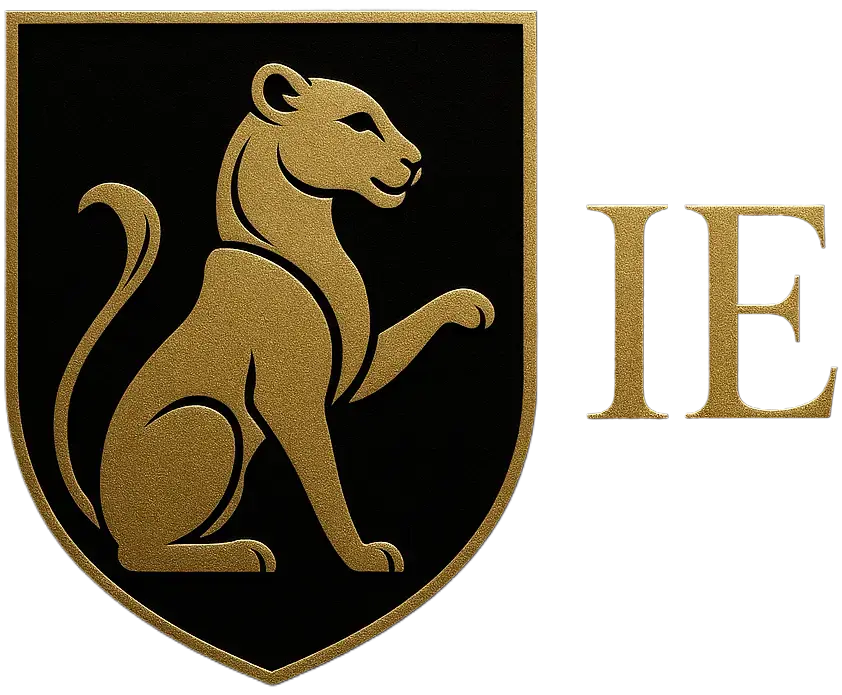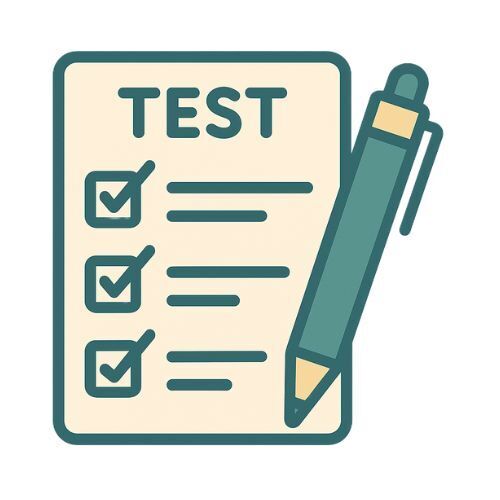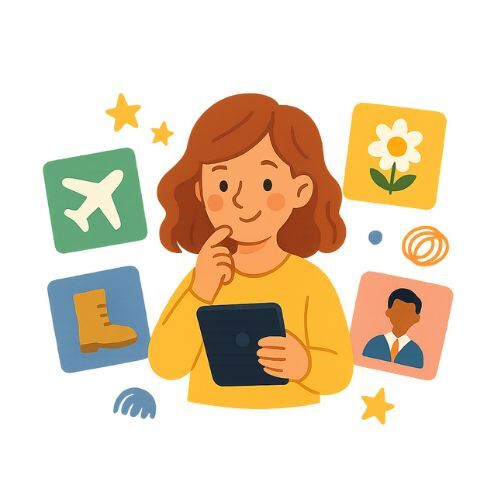1000 английских слов для начинающих: базовый словарный минимум с переводом и примерами
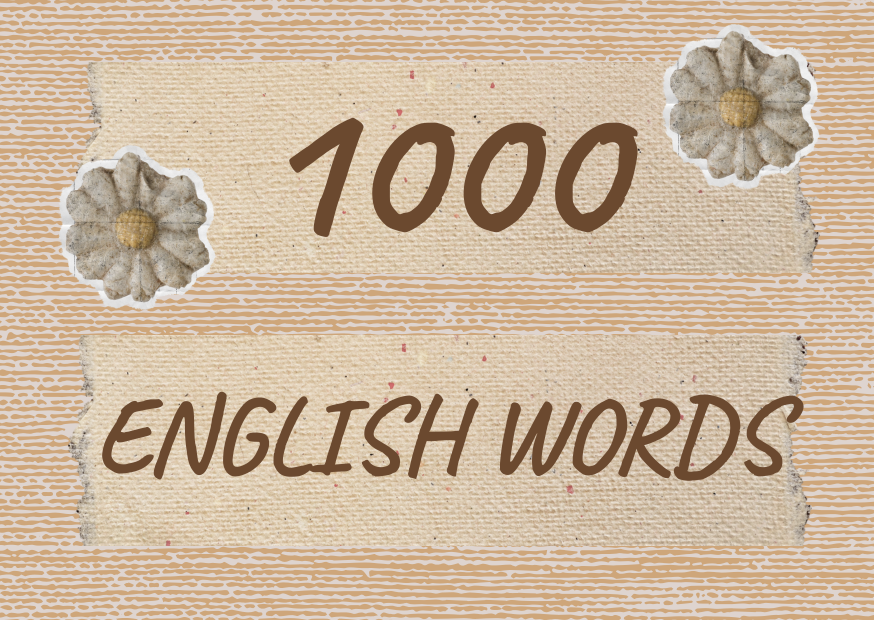
Введение: почему важно учить базовые английские слова
Любое изучение языка начинается со слов. Именно они дают возможность понимать собеседника и формулировать собственные мысли. Но хорошая новость в том, что для первых шагов в английском не нужно учить десятки тысяч слов. Достаточно сосредоточиться на самом употребительном словарном минимуме — примерно тысяче слов, которые встречаются в повседневной речи чаще всего.
Сколько английских слов нужно знать для начала
По данным корпусных исследований, 1000 наиболее частотных слов английского языка покрывают до 80–85% повседневных диалогов и текстов. Это значит, что уже после освоения этого набора вы сможете понимать основное содержание фильмов, новостей, подкастов и поддерживать простые разговоры. Для уровня начинающего (A1–A2 по CEFR) этого более чем достаточно, чтобы почувствовать уверенность в языке.
Что такое словарный минимум в английском
Словарный минимум — это тщательно отобранный набор слов, который позволяет максимально быстро выйти на практическое использование английского. В него входят:
- местоимения — без них не построить ни одного предложения;
- глаголы — фундамент для описания действий и состояний;
- существительные — слова, которые называют людей, предметы и явления;
- прилагательные — помогают описывать качества и эмоции;
- наречия и предлоги — делают речь более точной;
- модальные глаголы и служебные слова — помогают выражать возможность, необходимость и связывать части фраз.
В этой статье мы собрали именно такой список — 1000 английских слов с переводом и примерами, разделив их на удобные тематические блоки. Это ваш прочный фундамент, на котором легко строить дальнейшее изучение языка.
Английские местоимения — список с переводом
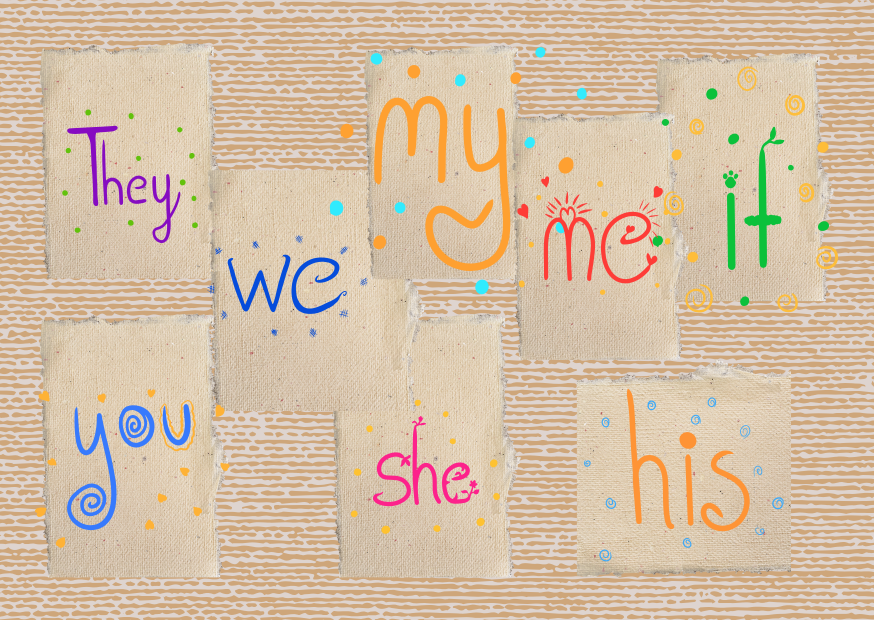
Местоимения — это слова, которые заменяют существительные. Они входят в базовый словарный запас из 1000 английских слов, поэтому вы будете использовать их в каждом диалоге.
1. Личные местоимения (Personal pronouns)
- I — я
- You — ты, вы
- He — он
- She — она
- It — оно, это
- We — мы
- They — они
2. Объектные местоимения (Object pronouns)
- me — меня, мне
- you — тебя, вас
- him — его, ему
- her — её, ей
- it — его, ему
- us — нас, нам
- them — их, им
3. Притяжательные местоимения (Possessive pronouns)
- my — мой
- your — твой, ваш
- his — его
- her — её
- its — его (для предметов/животных)
- our — наш
- their — их
Абсолютные формы:
- mine — мой
- yours — твой, ваш
- his — его
- hers — её
- ours — наш
- theirs — их
4. Возвратные местоимения (Reflexive pronouns)
- myself — себя
- yourself — себя
- himself — себя
- herself — себя
- itself — себя
- ourselves — себя, сами
- themselves — себя
5. Указательные местоимения (Demonstratives)
- this — этот
- that — тот
- these — эти
- those — те
6. Вопросительные местоимения (Interrogatives)
- who — кто
- what — что, какой
- which — который, какой из
- whose — чей
7. Относительные и неопределённые местоимения
Относительные:
- who — который
- which — который
- that — который
Неопределённые:
- someone / somebody — кто-то
- anyone / anybody — кто-нибудь, любой
- no one / nobody — никто
- something — что-то
- anything — что-нибудь
- nothing — ничего
- everything — всё
- everybody / everyone — все
8. Взаимные местоимения (Reciprocals)
- each other — друг друга
- one another — друг друга
Топ-250 английских глаголов
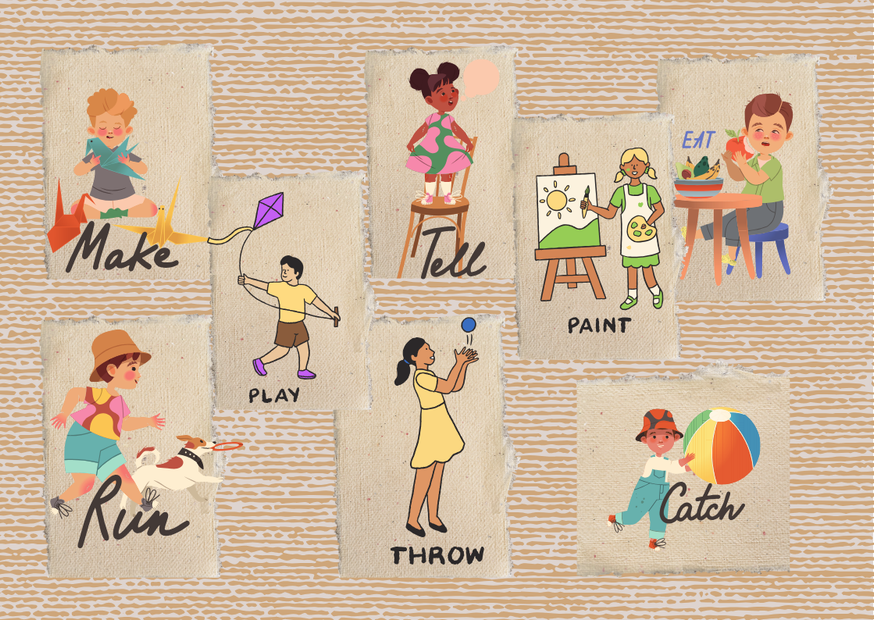
Глаголы — это основа английского языка. Именно они задают действие или состояние в предложении. Мы собрали 250 самых употребительных английских глаголов, которые входят в базовый словарный минимум. Освоив их, вы сможете строить тысячи предложений.
1. Базовые глаголы
- be — быть
- have — иметь
- do — делать
- get — получать
- go — идти
- come — приходить
- make — делать, создавать
- say — сказать
- tell — рассказывать
- think — думать
- know — знать
- see — видеть
- look — смотреть
- find — находить
- give — давать
- take — брать
- put — класть
- keep — хранить, держать
- let — позволять
- mean — значить
- work — работать
- use — использовать
- try — пытаться
- ask — спрашивать
- answer — отвечать
- call — звонить
- talk — разговаривать
- speak — говорить
- help — помогать
- play — играть
- like — нравиться
- love — любить
- want — хотеть
- need — нуждаться
- live — жить
- learn — учить
- teach — преподавать
- open — открывать
- close — закрывать
- read — читать
- write — писать
- eat — есть
- drink — пить
- sleep — спать
- buy — покупать
- sell — продавать
- pay — платить
- spend — тратить
- save — сохранять, копить
- move — двигаться
2. Действия в быту
- clean — чистить, убирать
- wash — мыть
- cook — готовить
- cut — резать
- break — ломать
- build — строить
- drive — водить машину
- ride — ездить верхом
- walk — ходить
- run — бегать
- sit — сидеть
- stand — стоять
- lie — лежать
- wait — ждать
- stop — останавливаться
- start — начинать
- finish — заканчивать
- change — менять
- show — показывать
- watch — смотреть
- listen — слушать
- hear — слышать
- touch — трогать
- smell — нюхать
- taste — пробовать на вкус
- hold — держать
- carry — нести
- throw — бросать
- catch — ловить
- hit — ударять
- push — толкать
- pull — тянуть
- climb — карабкаться
- jump — прыгать
- swim — плавать
- fly — летать
- travel — путешествовать
- visit — посещать
- enter — входить
- leave — уходить
- arrive — прибывать
- stay — оставаться
- return — возвращаться
- bring — приносить
- send — отправлять
- receive — получать
- choose — выбирать
- decide — решать
- plan — планировать
3. Учёба и работа
- study — учиться
- practice — практиковаться
- repeat — повторять
- explain — объяснять
- understand — понимать
- remember — помнить
- forget — забывать
- agree — соглашаться
- disagree — не соглашаться
- believe — верить
- hope — надеяться
- imagine — воображать
- create — создавать
- invent — изобретать
- develop — развивать
- improve — улучшать
- test — проверять
- earn — зарабатывать
- spend — тратить
- produce — производить
- manage — управлять
- lead — руководить
- follow — следовать
- train — тренировать
- research — исследовать
- examine — изучать
- check — проверять
- report — докладывать
- organize — организовывать
- prepare — готовить
- fix — чинить
- design — проектировать
- meet — встречать
- discuss — обсуждать
- argue — спорить
- finish — завершать
- check — проверять
- present — представлять
- report — сообщать
- note — отмечать
- mark — оценивать
- examine — проверять
- plan — планировать
- complete — завершать
- achieve — достигать
- build — строить
- improve — улучшать
- share — делиться
- note — замечать
- collect — собирать
4. Общение и чувства
- smile — улыбаться
- laugh — смеяться
- cry — плакать
- kiss — целовать
- hug — обнимать
- miss — скучать
- trust — доверять
- respect — уважать
- forgive — прощать
- thank — благодарить
- invite — приглашать
- welcome — приветствовать
- text — писать сообщение
- promise — обещать
- advise — советовать
- warn — предупреждать
- shout — кричать
- whisper — шептать
- complain — жаловаться
- praise — хвалить
- criticize — критиковать
- describe — описывать
- inform — информировать
- remind — напоминать
- order — приказывать
- command — командовать
- offer — предлагать
- discuss — обсуждать
- argue — спорить
- explain — объяснять
- agree — соглашаться
- disagree — не соглашаться
- joke — шутить
- greet — приветствовать
- apologize — извиняться
- encourage — ободрять
- support — поддерживать
- motivate — мотивировать
- persuade — убеждать
- convince — уверять
- exclaim — восклицать
- announce — объявлять
- expose — разоблачать
- confess — признаваться
- declare — заявлять
- admit — признавать
- persuade — уговаривать
- invite — приглашать
- introduce — представлять
5. Природа и окружающий мир
- rain — идти (о дожде)
- snow — идти (о снеге)
- shine — светить
- blow — дуть
- grow — расти
- plant — сажать
- burn — гореть
- freeze — замерзать
- melt — таять
- flow — течь
- rise — подниматься
- fall — падать
- destroy — разрушать
- create — создавать
- appear — появляться
- disappear — исчезать
- stay — оставаться
- turn — поворачивать
- wake — просыпаться
- dream — мечтать, видеть сон
- happen — происходить
- exist — существовать
- survive — выживать
- disappear — исчезать
- climb — карабкаться
- run — бегать
- walk — ходить
- stand — стоять
- sit — сидеть
- lie — лежать
- observe — наблюдать
- explore — исследовать
- hunt — охотиться
- fish — ловить рыбу
- collect — собирать
- gather — собирать
- dig — копать
- cover — покрывать
- protect — защищать
- save — спасать
- harm — вредить
- kill — убивать
- die — умирать
- live — жить
- feed — кормить
- grow — выращивать
- produce — производить
- use — использовать
Топ-250 английских существительных
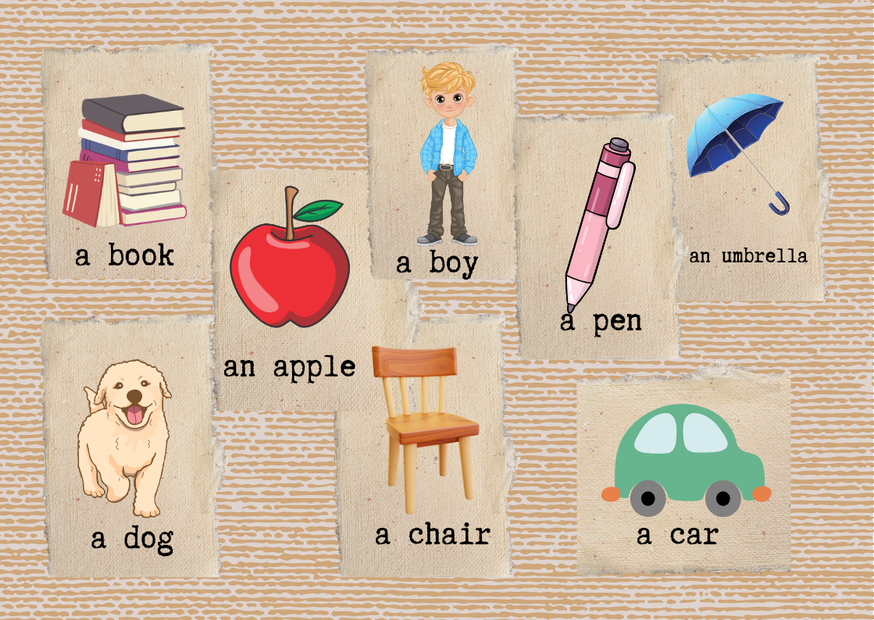
Существительные — это основа любого языка. Именно они называют людей, предметы, явления и события. Мы собрали 250 самых нужных английских существительных, которые входят в базовый словарный минимум. Эти слова пригодятся вам каждый день — в общении, чтении и на работе.
1. Люди и семья
- man — мужчина
- woman — женщина
- child — ребёнок
- boy — мальчик
- girl — девочка
- friend — друг
- mother — мать
- father — отец
- son — сын
- daughter — дочь
- brother — брат
- sister — сестра
- family — семья
- parent — родитель
- baby — младенец
- husband — муж
- wife — жена
- uncle — дядя
- aunt — тётя
- cousin — двоюродный брат/сестра
- grandfather — дедушка
- grandmother — бабушка
- grandson — внук
- granddaughter — внучка
- people — люди
- person — человек
- neighbor — сосед
- teacher — учитель
- student — студент
- doctor — врач
- nurse — медсестра
- worker — рабочий
- farmer — фермер
- driver — водитель
- seller — продавец
- customer — покупатель
- boss — начальник
- colleague — коллега
- guest — гость
- stranger — незнакомец
- actor — актёр
- actress — актриса
- king — король
- queen — королева
- childhood — детство
- youth — молодость
- adult — взрослый
- nation — нация
- crowd — толпа
- team — команда
2. Животные
- dog — собака
- cat — кошка
- bird — птица
- fish — рыба
- horse — лошадь
- cow — корова
- pig — свинья
- sheep — овца
- goat — коза
- chicken — курица
- duck — утка
- mouse — мышь
- rat — крыса
- rabbit — кролик
- wolf — волк
- fox — лиса
- bear — медведь
- lion — лев
- tiger — тигр
- elephant — слон
- monkey — обезьяна
- snake — змея
- frog — лягушка
- insect — насекомое
- bee — пчела
- butterfly — бабочка
- ant — муравей
- spider — паук
- whale — кит
- dolphin — дельфин
3. Дом и предметы
- house — дом
- flat — квартира
- room — комната
- kitchen — кухня
- bathroom — ванная
- bedroom — спальня
- living room — гостиная
- bed — кровать
- table — стол
- chair — стул
- sofa — диван
- armchair — кресло
- window — окно
- door — дверь
- floor — пол
- ceiling — потолок
- wall — стена
- lamp — лампа
- light — свет
- clock — часы
- picture — картина
- mirror — зеркало
- cup — чашка
- plate — тарелка
- spoon — ложка
- fork — вилка
- knife — нож
- glass — стакан
- bottle — бутылка
- bag — сумка
- box — коробка
- key — ключ
- phone — телефон
- computer — компьютер
- TV — телевизор
- radio — радио
- book — книга
- pen — ручка
- paper — бумага
- notebook — тетрадь
4. Еда и напитки
- food — еда
- bread — хлеб
- butter — масло
- cheese — сыр
- meat — мясо
- chicken — курица
- fish — рыба
- egg — яйцо
- fruit — фрукты
- apple — яблоко
- banana — банан
- orange — апельсин
- grape — виноград
- vegetable — овощ
- potato — картофель
- tomato — помидор
- cucumber — огурец
- carrot — морковь
- onion — лук
- garlic — чеснок
- rice — рис
- pasta — макароны
- soup — суп
- salad — салат
- sugar — сахар
- salt — соль
- pepper — перец
- oil — масло
- water — вода
- tea — чай
- coffee — кофе
- milk — молоко
- juice — сок
- wine — вино
- beer — пиво
- cake — торт
- pie — пирог
- chocolate — шоколад
- ice cream — мороженое
5. Места и путешествия
- city — город
- town — городок
- village — деревня
- street — улица
- road — дорога
- square — площадь
- shop — магазин
- market — рынок
- restaurant — ресторан
- cafe — кафе
- hotel — отель
- bank — банк
- office — офис
- school — школа
- university — университет
- hospital — больница
- station — станция
- airport — аэропорт
- bus stop — автобусная остановка
- park — парк
- playground — детская площадка
- museum — музей
- theatre — театр
- cinema — кинотеатр
- library — библиотека
- church — церковь
- bridge — мост
- river — река
- sea — море
- ocean — океан
- island — остров
- forest — лес
- mountain — гора
- hill — холм
- field — поле
- farm — ферма
- garden — сад
- shopper — покупатель
- factory — фабрика
6. Время и праздники
- time — время
- year — год
- month — месяц
- week — неделя
- day — день
- hour — час
- minute — минута
- second — секунда
- morning — утро
- afternoon — день
- evening — вечер
- night — ночь
- holiday — праздник
- birthday — день рождения
- weekend — выходные
- vacation — отпуск
- season — сезон
- winter — зима
- spring — весна
- summer — лето
- autumn — осень
- morning — утро
- future — будущее
- past — прошлое
- present — настоящее
7. Абстрактные понятия
- life — жизнь
- death — смерть
- love — любовь
- hate — ненависть
- hope — надежда
- dream — мечта
- idea — идея
- problem — проблема
- question — вопрос
- answer — ответ
- way — путь
- place — место
- thing — вещь
- money — деньги
- work — работа
- job — работа
- power — сила, власть
- health — здоровье
- help — помощь
- truth — правда
- lie — ложь
- knowledge — знания
- information — информация
- news — новости
- story — история
Английские прилагательные: список из 150 слов с переводом
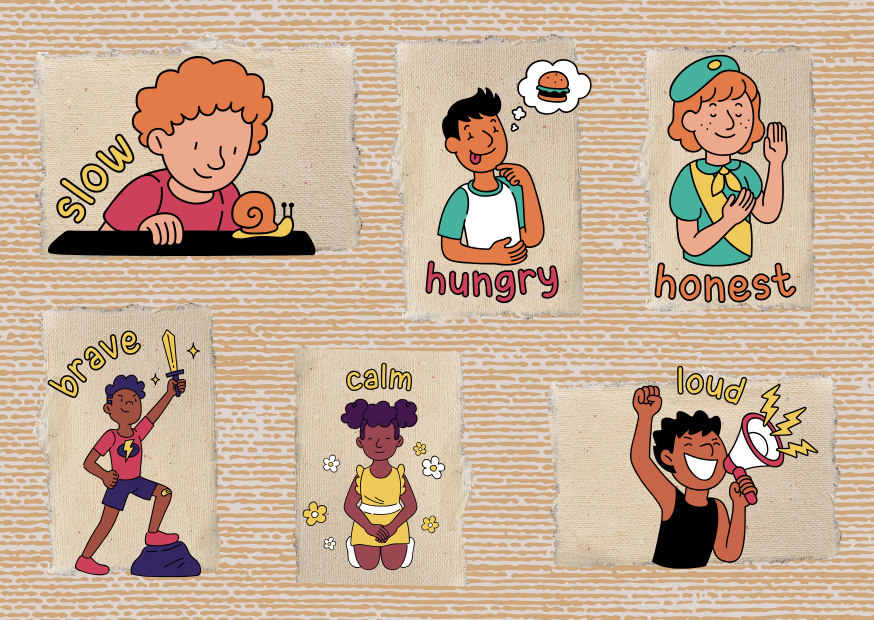
Прилагательные помогают описывать людей, предметы, явления и эмоции. Это слова, которые делают речь выразительной и точной. В этом разделе собран полный список из 150 базовых английских прилагательных, которые входят в частотный словарный минимум.
1. Описание людей и характера
- young — молодой
- old — старый
- tall — высокий
- short — низкий
- big — большой
- small — маленький
- slim — стройный
- fat — толстый
- beautiful — красивый
- ugly — некрасивый
- handsome — привлекательный (о мужчине)
- kind — добрый
- polite — вежливый
- rude — грубый
- friendly — дружелюбный
- unfriendly — недружелюбный
- clever — умный
- stupid — глупый
- lazy — ленивый
- hard-working — трудолюбивый
2. Эмоции и состояния
- happy — счастливый
- sad — грустный
- angry — злой
- calm — спокойный
- excited — взволнованный
- tired — уставший
- hungry — голодный
- thirsty — испытывающий жажду
- afraid — испуганный
- brave — смелый
- shy — застенчивый
- lonely — одинокий
- proud — гордый
- worried — обеспокоенный
- relaxed — расслабленный
- serious — серьёзный
- funny — смешной
- confident — уверенный
- interested — заинтересованный
- bored — скучающий
3. Описание предметов и среды
- new — новый
- old — старый
- modern — современный
- old-fashioned — старомодный
- clean — чистый
- dirty — грязный
- bright — яркий
- dark — тёмный
- light — светлый / лёгкий
- heavy — тяжёлый
- soft — мягкий
- hard — твёрдый
- safe — безопасный
- dangerous — опасный
- open — открытый
- closed — закрытый
- cheap — дешёвый
- expensive — дорогой
- useful — полезный
- useless — бесполезный
4. Качества и оценки
- good — хороший
- bad — плохой
- easy — лёгкий
- difficult — трудный
- simple — простой
- important — важный
- main — главный
- different — разный
- same — тот же самый
- true — верный, правдивый
- false — ложный
- real — реальный
- possible — возможный
- impossible — невозможный
- right — правильный
- wrong — неправильный
- popular — популярный
- famous — известный
- special — особенный
- common — обычный
5. Цвета
- white — белый
- black — чёрный
- red — красный
- blue — синий
- green — зелёный
- yellow — жёлтый
- orange — оранжевый
- pink — розовый
- purple — фиолетовый
- grey — серый
- brown — коричневый
- golden — золотой
- silver — серебряный
Наречия и предлоги: список из 150 слов
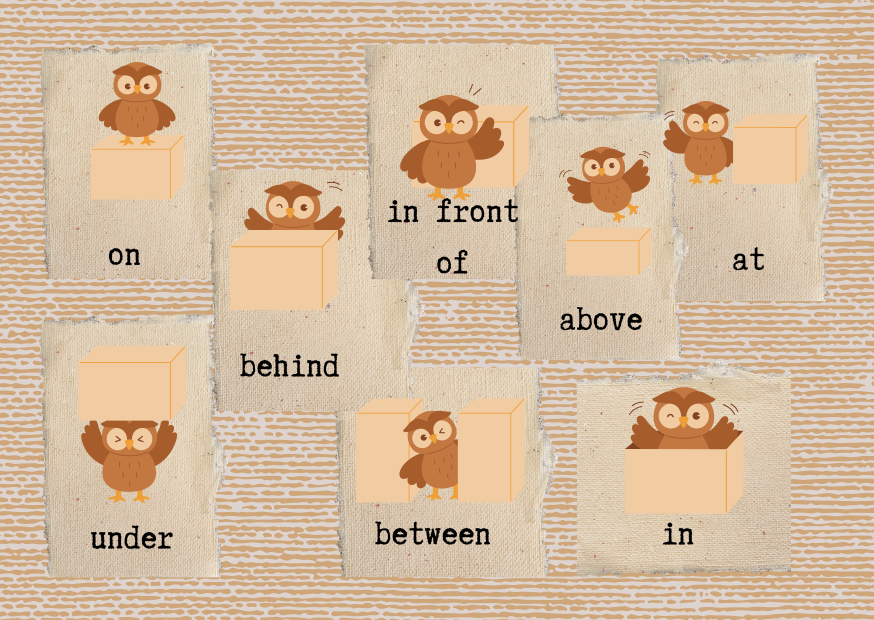
Наречия и предлоги — это связующие слова, которые делают речь понятной и точной. Они помогают описывать как, когда и где происходит действие. Ниже собран полный список из 150 базовых наречий и предлогов, которые входят в частотный минимум английского языка.
1. Наречия частотности и времени
- always — всегда
- usually — обычно
- often — часто
- sometimes — иногда
- rarely — редко
- never — никогда
- already — уже
- still — всё ещё
- yet — ещё, пока
- just — только что
- ever — когда-либо
- soon — скоро
- late — поздно
- early — рано
- today — сегодня
- tomorrow — завтра
- yesterday — вчера
- now — сейчас
- then — затем, потом
- before — раньше
- afterwards — впоследствии
2. Наречия образа действия
- well — хорошо
- badly — плохо
- quickly — быстро
- slowly — медленно
- easily — легко
- hard — усердно
- carefully — осторожно
- clearly — ясно
- loudly — громко
- quietly — тихо
- happily — счастливо
- sadly — грустно
- politely — вежливо
- angrily — сердито
- easily — легко
- fast — быстро
- together — вместе
- alone — один, в одиночку
- right — прямо, правильно
- wrong — неправильно
3. Наречия степени
- very — очень
- really — действительно
- quite — довольно
- rather — скорее, довольно
- enough — достаточно
- too — слишком
- almost — почти
- completely — полностью
- totally — совершенно
- partly — частично
- nearly — почти
- exactly — точно
- just — именно, как раз
- probably — вероятно
- surely — наверняка
4. Наречия места и направления
- here — здесь
- there — там
- everywhere — везде
- nowhere — нигде
- somewhere — где-то
- anywhere — где угодно
- up — вверх
- down — вниз
- back — назад
- forward — вперёд
- inside — внутри
- outside — снаружи
- away — прочь
- nearby — поблизости
- around — вокруг
5. Основные предлоги
- in — в
- on — на
- at — в, у
- by — около, у
- under — под
- over — над
- between — между
- among — среди
- before — до, перед
- after — после
- from — из, от
- to — к, в
- for — для
- with — с
- without — без
- about — о, про
- of — из, от, принадлежность
- into — внутрь
- out of — из
- through — через
- across — через
- behind — позади
- in front of — перед
- next to — рядом с
- opposite — напротив
- above — выше
- below — ниже
6. Часто используемые предлоги и связки
- during — во время
- until — до тех пор, пока
- since — с (какого-то времени)
- within — в пределах
- despite — несмотря на
- instead of — вместо
- because of — из-за
- according to — согласно
- thanks to — благодаря
- like — как
- unlike — в отличие от
- except — кроме
- including — включая
- without — без
- per — на, в (пример: per day — в день)
Модальные глаголы и служебные слова: список из 120 слов
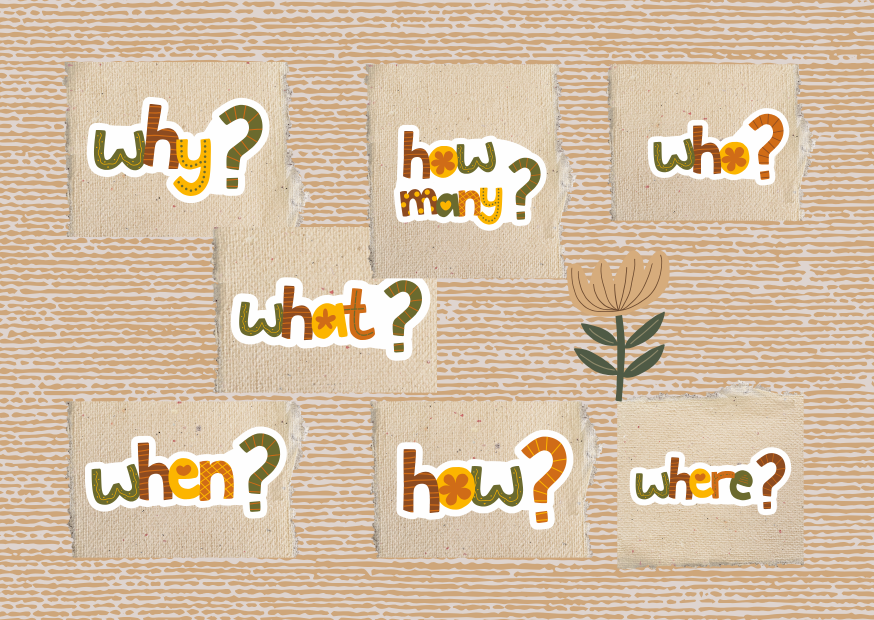
Модальные глаголы и служебные слова помогают выражать возможность, необходимость, обязанность, а также связывать части предложений и строить правильные конструкции. Эти слова встречаются в каждом диалоге и входят в базовый словарный запас. Ниже — список из 120 самых нужных слов.
1. Модальные глаголы
- can — мочь
- could — мог бы
- may — можно, мочь
- might — может быть
- must — должен
- shall — следует
- should — следует
- will — будет
- would — бы
- ought to — следует
- need — нужно
- dare — осмеливаться
- have to — приходится
- be able to — быть способным
- used to — раньше делал
- shouldn’t — не следует
- can’t — не мочь
- won’t — не буду
- wouldn’t — не стал бы
- mustn’t — нельзя
2. Вспомогательные глаголы
- am — есть (I am)
- is — есть (he is)
- are — есть (they are)
- was — был
- were — были
- be — быть
- being — будучи
- been — был
- do — делать (вспом.)
- does — делает
- did — делал
- done — сделано
- have — иметь
- has — имеет
- had — имел
- having — имея
- will be — будет
- will have — будет иметь
- would have — имел бы
3. Союзы
- and — и
- or — или
- but — но
- because — потому что
- so — поэтому
- if — если
- though — хотя
- although — хотя
- while — пока
- when — когда
- where — где
- since — так как, с
- as — как, так как
- until — пока не
- unless — если не
- whether — ли
- that — что
- both…and — и … и
- either…or — или … или
- neither…nor — ни … ни
4. Частицы
- not — не
- only — только
- even — даже
- just — только что, просто
- also — также
- too — тоже
- still — всё ещё
- already — уже
- yet — ещё, пока
- again — снова
- ever — когда-либо
- never — никогда
- really — действительно
- quite — вполне
- rather — скорее
- almost — почти
- exactly — точно
- absolutely — абсолютно
- certainly — конечно
- maybe — может быть
5. Вопросительные слова
- who — кто
- whom — кого
- whose — чей
- what — что
- which — который
- when — когда
- where — где
- why — почему
- how — как
- how much — сколько (неисчисл.)
- how many — сколько (исчисл.)
- how long — как долго
- how often — как часто
- how far — как далеко
- what kind of — какой вид
- which one — который из
- who else — кто ещё
- what else — что ещё
- when exactly — когда именно
- how soon — как скоро
6. Устойчивые служебные слова и выражения
- yes — да
- no — нет
- okay — хорошо
- alright — ладно
- well — ну, хорошо
- please — пожалуйста
- thanks — спасибо
- thank you — спасибо
- sorry — извините
- excuse me — простите
- hello — привет
- hi — привет
- goodbye — до свидания
- bye — пока
- see you — увидимся
- good morning — доброе утро
- good afternoon — добрый день
- good evening — добрый вечер
- good night — спокойной ночи
- take care — береги себя
Как выучить 1000 английских слов быстро и эффективно
Посмотреть на список слов — это только начало. Чтобы они превратились в активный словарный запас, нужно правильно организовать обучение. Вот стратегии, которые реально работают.
1. Учите слова в контексте
Слова лучше запоминаются в связке с фразой или предложением. Например, вместо отдельного «apple — яблоко» выучите «I like apples — Мне нравятся яблоки». Так мозг сразу понимает, как слово используется в реальной речи.
2. Используйте интервальные повторения
Метод «spaced repetition» (интервальные повторения) позволяет учить быстрее и надёжнее. Приложения Anki, Quizlet или даже простые карточки помогут повторять слова именно тогда, когда вы начинаете их забывать.
3. Ставьте маленькие цели
Разбейте процесс: учите по 20–30 слов в день. Так вы сможете освоить 600–900 слов за месяц без перегрузки. Главное — регулярность.
4. Применяйте новые слова
Чтобы слово закрепилось, его нужно использовать. Составляйте свои предложения, ведите дневник на английском, переписывайтесь с друзьями или тренируйтесь с языковым партнёром. Даже несколько предложений в день дают результат.
5. Группируйте по темам
Учить слова блоками («еда», «дом», «работа») легче, чем случайным списком. Тематические группы создают связи в памяти и помогают быстрее вспоминать нужные слова в разговоре.
6. Подключайте разные каналы памяти
Не ограничивайтесь чтением. Произносите слова вслух, записывайте их, слушайте аудио. Когда задействованы зрительная, слуховая и моторная память, результат в разы лучше.
7. Отслеживайте прогресс
Отмечайте уже выученные слова. Можно вести таблицу или использовать приложения для учёта. Видеть, что вы уже знаете 200, 500 или 800 слов — мощная мотивация продолжать.
Вывод: 1000 английских слов можно выучить за 2–3 месяца, если заниматься регулярно и использовать комбинацию методов: контекст, повторения, практика и контроль прогресса.
FAQ: ответы на частые вопросы
Сколько слов нужно знать, чтобы свободно говорить по-английски?
Для базового общения достаточно 1000–1500 слов. Чтобы комфортно чувствовать себя в большинстве ситуаций — 3000–4000 слов. А для свободного владения языком, как у носителей, нужно 8000–10000 слов и больше. Но первые 1000 слов дают до 80% понимания повседневной речи.
Сколько времени займёт изучение 1000 слов?
Если учить по 20–30 слов в день, то на освоение уйдёт около 2–3 месяцев. При меньшей нагрузке (10 слов в день) понадобится примерно полгода.
Нужно ли учить слова с примерами предложений?
Да, это эффективнее. Слово в контексте запоминается быстрее и надёжнее, чем в отрыве. Например, «to make» лучше учить в связках «make a mistake» (совершить ошибку), «make a decision» (принять решение).
Какие приложения лучше всего подходят для запоминания?
Популярные и удобные — Anki, Quizlet, Memrise. Они используют интервальные повторения и позволяют учить слова в удобном формате карточек.
Стоит ли учить сразу фразы, а не отдельные слова?
Да, но с балансом. Сначала важно выучить базовые слова, а затем закрепить их во фразах. Так вы быстрее начнёте использовать лексику в реальной речи.
Как не забыть слова через месяц?
Секрет простой: регулярные повторения. Используйте метод интервальных повторений и не забывайте применять слова в своей речи. Если слово встречается в жизни хотя бы несколько раз, оно надолго остаётся в памяти.
Заключение: что делать дальше
Тысяча английских слов — это не просто список, а прочный фундамент для владения языком. Освоив эти слова, вы сможете понимать до 80% повседневной речи, строить простые диалоги и уверенно чувствовать себя в общении.
Главное — не останавливаться. Делите процесс на маленькие шаги, повторяйте регулярно и используйте новые слова в реальных ситуациях. Так они станут частью вашего активного словаря.
Что дальше? После того как 1000 слов окажутся у вас «в арсенале», переходите к расширению словаря до 3000–4000 слов, а также уделяйте внимание грамматике и практике устной речи. Это следующий этап, который сделает ваш английский по-настоящему живым и свободным.
Помните: язык учится не за один день, но каждый выученный десяток слов — это маленькая победа. Начните сегодня, и уже через пару месяцев вы удивитесь, сколько нового сможете сказать и понять!
